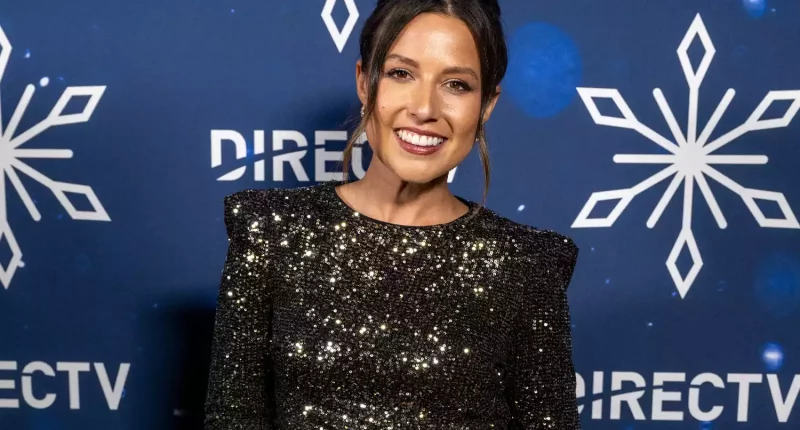Katie Thurston Delayed Her Mole Check During Breast Cancer. Celebrity star, known for her time as “The Bachelorette,” has been candid about her ongoing battle with stage 4 breast cancer. Recently, she shared a deeply personal moment: her hesitation to schedule a dermatology appointment to have her moles checked. The reason for her reluctance was simple yet profoundly relatable-she didn’t want to receive “more bad news” while already navigating the emotional and physical toll of her cancer journey.

Katie Thurston Opens Up About Fear of More Bad News Amid Breast Cancer Battle
The reality TV star revealed on her Boobie Broadcast channel that, although she knew the importance of regular skin checks, she initially resisted the idea. “I didn’t want to. I don’t want to know more bad news,” she admitted, echoing a sentiment many facing serious illness will recognize. For anyone living with a major diagnosis, the thought of uncovering yet another health issue can be overwhelming.
However, Thurston ultimately reminded herself of the values she encourages in others: being proactive and brave when it comes to health. She wrote, “But then I remembered it goes against everything I preach about being proactive and brave for yourself. So I hit send. Might as well maximize my insurance benefits this year”. Her decision to proceed, despite her fears, illustrates the courage required to prioritize one’s well-being, even in the face of daunting uncertainty.
The Reality of Health Anxiety During Cancer
Katie’s story is not unique. Many individuals with cancer or other chronic illnesses experience what’s known as “scanxiety”-the anxiety that comes with medical scans and tests, fearing further bad news. This emotional burden can lead to avoidance, even when vigilance is critical for early detection and better outcomes.
:max_bytes(150000):strip_icc():focal(661x465:663x467):format(webp)/Katie-Thurston-062924-6c753ea7c6794f589773ad10a623999b.jpg)
Her experience underscores a broader issue: the misconception that younger women are less at risk for breast cancer or skin cancer. In fact, recent data show that breast cancer can and does affect younger women, sometimes with more aggressive forms. Moreover, skin cancer is one of the most common cancers in the United States, and regular skin checks are a vital part of preventive care.
Don’t Miss | Julien Baker Cancels Remaining Tour Dates With Torres, Cites Health Concerns in Statement
Lessons in Self-Advocacy and Early Detection
Katie Thurston’s journey offers several key takeaways for anyone concerned about their health:
- Don’t Ignore Symptoms: Thurston’s own diagnosis began when she noticed a sore lump in her breast, which she initially dismissed as a benign issue. Her story highlights the importance of listening to one’s body and seeking medical advice promptly.
- Be Proactive: Regular screenings-whether for breast cancer, skin cancer, or other conditions-can catch problems early, often before they become life-threatening. Early detection is associated with significantly better outcomes.
- Emotional Health Matters: The fear of bad news is real and valid. Addressing it openly, as Thurston has, can help others feel less alone and more empowered to take necessary steps for their health.
The Broader Impact: Financial and Emotional Strain
Beyond the medical challenges, Katie has spoken about the financial and logistical burdens that come with a cancer diagnosis. From moving cities for treatment to navigating insurance and fertility preservation, the impact extends well beyond physical health. Many patients face similar hurdles, which can add to the reluctance to pursue further testing or care.
A Message of Hope and Resilience
Despite the difficulties, Thurston’s openness provides hope and encouragement. She has shared updates about her treatment, including a recent shift to hormone-blocking therapy instead of chemotherapy after a second opinion clarified her diagnosis. This adaptability and willingness to seek out the best care possible serve as a reminder of the importance of self-advocacy.
When Should You Get Your Moles Checked?
According to dermatologists, you should schedule a skin check if you notice:
- A mole that changes in size, shape, or color
- New moles after age 30
- Moles that itch, bleed, or look different from others (“ugly duckling” sign)
Annual skin checks are recommended for those with risk factors, such as fair skin, a history of sunburns, or a family history of skin cancer.
Conclusion
Katie Thurston’s willingness to share her fears and ultimately act in her own best interest is a powerful example for others. Her story is a reminder that being proactive about health-even when it’s frightening-is an act of self-care and courage. For those facing similar anxieties, her journey offers reassurance: it’s normal to be scared, but taking action can make all the difference.
Don’t Miss | Dax Shepard Jokes About Wearing Socks at Pool After Toe Surgery Mishap








